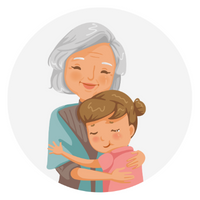Disclaimer: Devoted Grandma is reader-supported. If you purchase anything through my site, I may receive a small commission (at no cost to you). Thank you.

Oh, how the world has changed since we were young! We grandmothers may have grown up in a time when phones were attached to the wall, friendships were built face-to-face, and the biggest school stress was a surprise math quiz. But our older grandchildren live in a world filled with challenges we never had to face, and truth be told, many of us aren’t fully prepared to help them navigate these struggles.
That doesn’t mean we can’t be there for them—it just means we need to open our hearts and minds to the reality of their world. Understanding what they’re going through is the first step to being the wise, comforting presence they need.
So let’s take a look at some of the modern struggles our older grandchildren are dealing with—things we may not have expected, but certainly want to help them through.
1. The Pressure of Perfection on Social Media
We all know what it’s like to compare ourselves to others—whether it was the neighbor’s perfect garden or the friend who always looked so put-together. But today’s kids and young adults are growing up in a world where they’re constantly exposed to images of so-called “perfect” lives. Social media bombards them with filtered pictures, curated success stories, and unrealistic beauty standards.
It’s not just about looking good; it’s about performing success. They feel pressure to have the best vacations, the most exciting jobs, the happiest relationships—all while hiding their struggles.
How We Can Help:
We can remind them that life isn’t a highlight reel. We can share stories from our own lives about times we failed, faced hardships, or didn’t have everything together. By showing them our imperfections, we help them realize that real life is messy—and that’s okay.
2. The Loneliness Epidemic
You’d think that with texting, video calls, and social media, our grandkids would feel more connected than ever. But in reality, many of them are lonelier than we ever were. Friendships today often rely on digital interactions rather than real, face-to-face connections. And in a world that moves fast, friendships can be fleeting.
Many young people feel isolated, even in a crowd. They might have hundreds of online “friends” but struggle to find one person they can truly confide in.
How We Can Help:
We can be a steady, dependable presence in their lives. A simple phone call, a handwritten letter, or a heartfelt check-in can make all the difference. And when they do open up, we should listen—really listen—without dismissing their feelings.
3. Uncertainty About the Future
Years ago, life seemed to follow a clear path: finish school, find a job, start a family, and settle down. Today’s young adults are facing a much more complicated reality.
The cost of education is overwhelming, job markets are unpredictable, and many of them feel like they’re stumbling through life without a clear direction. The pressure to “have it all figured out” by their 20s can leave them feeling anxious and lost.
How We Can Help:
We can remind them that life isn’t a straight line. Many of us took unexpected detours before finding our way. Sharing our own winding journeys—whether it was changing careers, making mistakes, or figuring things out later in life—can reassure them that it’s okay to take time to find their path.
4. Burnout from Overworking
Hustle culture is everywhere. Many young people feel like they must always be working, achieving, and proving themselves. Whether it’s school, a job, or side projects, they are constantly told that they need to be productive or they’ll fall behind.
This leaves many of them exhausted, anxious, and questioning if they’ll ever be able to slow down.
How We Can Help:
We can remind them that rest is necessary, not a weakness. Encouraging them to set boundaries, take breaks, and prioritize their well-being can go a long way. Sometimes, just hearing “It’s okay to slow down” from someone they trust makes all the difference.
5. Mental Health Struggles That Are Hard to Talk About
Anxiety, depression, and stress are more common than ever among young people. But many of them feel they have to keep their struggles hidden. Even though mental health is talked about more now, there’s still a stigma—especially in families where emotional struggles were never openly discussed.
How We Can Help:
We don’t have to be experts—we just have to be a safe space. Instead of brushing off their worries or saying “just toughen up,” we can listen with empathy. Letting them know it’s okay to seek help and that they’re not alone can be a lifesaver.
6. Relationships and Dating in a Digital World
Dating today is nothing like it was in our time. Many relationships begin online, social media plays a role in everything, and the culture of “instant gratification” has made commitment more complicated.
Young people face ghosting, pressure to be “relationship goals,” and even the struggle of comparing their love lives to others on social media.
How We Can Help:
We can offer timeless wisdom: respect, communication, and kindness never go out of style. Rather than criticizing how they date, we can be there when they need advice—without judgment.
7. The Fear of Failing in a Competitive World
Many of our grandkids feel like they can’t afford to fail. The world is so competitive that they’re constantly worried about making the wrong choice, not being “successful enough,” or letting people down.
How We Can Help:
We can remind them that failure is not the end—it’s part of life. Sharing our own failures and how we grew from them can help take the fear out of making mistakes.
8. The Struggle to Define Their Own Identity
Today’s young adults have more freedom than ever to shape their own identities, but with that freedom comes pressure. They are constantly being told who they should be, how they should think, and what they should stand for.
How We Can Help:
Instead of telling them what they “should” do, we can let them explore their own paths while offering unconditional love and support.
9. Misinformation and the Overload of News
The internet bombards young people with news, opinions, and conflicting information 24/7. It’s hard to know what’s true and what’s not, which can lead to confusion and anxiety.
How We Can Help:
We can encourage them to think critically, ask questions, and seek out reliable sources—without forcing our own opinions on them.
10. A Decline in Basic Life Skills
Many schools don’t teach essential life skills anymore, and as a result, some young adults struggle with things like cooking, budgeting, or simple home maintenance.
How We Can Help:
This is where we shine! Teaching them how to cook a meal, sew a button, or budget wisely isn’t just practical—it’s a beautiful way to bond.
Final Thoughts: Being the Grandmother They Need in a Changing World
We may not have grown up with these struggles, but our role as grandmothers remains the same: to love them, support them, and help them navigate life’s ups and downs with wisdom and warmth.
So let’s open our hearts, set aside judgment, and remind them that no matter how much the world changes, a grandmother’s love is a constant they can always count on.

